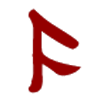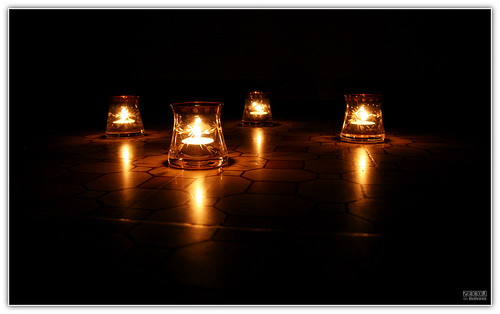Ansuz is another complex rune, and its energies and manifestations are very predominant in our time. The common interpretation is that this rune signifies “a god”, that is, one of the Aesir, particularly Odin. It refers to a personal ancestry that traces back to the old gods, and therefor our divine inheritance. It is also linked to the mouth, breath and speech, persuasion and inspiration.
 Photo by Marsý
Photo by Marsý
The Passing of Breath
 It may be very useful to examine Ansuz as meaning “the passing of breath.” This short conceptual epigram links its communication aspects to its ancestral overtone, as well as to the idea that Odin gave us the original breath or “inspiration” to live as humans. “Inspiration” is etymologically linked to the breath, and further back to the word enthusiasm by the Ancient Greeks, who would use the word to signify “god-breathed”. It is entirely possible that this is a cross-cultural idea.
It may be very useful to examine Ansuz as meaning “the passing of breath.” This short conceptual epigram links its communication aspects to its ancestral overtone, as well as to the idea that Odin gave us the original breath or “inspiration” to live as humans. “Inspiration” is etymologically linked to the breath, and further back to the word enthusiasm by the Ancient Greeks, who would use the word to signify “god-breathed”. It is entirely possible that this is a cross-cultural idea.
In terms of the ancestral lines, not only blood and genes are passed, but something less tangible — a breath passed from parent to child since the beginning.
The Passing of Breath also links this rune to communication: language, linguisitcs and the ordering effect that symbols have on human consciousness. The transmuting effects of symbols on the mind in undeniable — and herein lay a great magic to uncover.
Underlying all this is our basic need to “pass our breath”, that is: share meaning, communicate, persuade and order the universe symbolically. It is not only the gene that needs to survive, but the meme: the memory. The Name.
Giants Versus the Aesir
The gods of the Aesir represent order and consciousness (contrasted to the prior rune, Thurisaz, which represents unconscious and proto-conscious forces, the “giants”) so Ansuz’ chief magic is that of ordering and transmuting the unconscious into the conscious through symbols. This war between the giants and the gods, is actually a very perceptive metaphor for the pre-conscious, unawakened forces that struggle against the awakening consciousness in the universe. We can see this war play itself out everywhere, within us and without.
Ansuz represents the civilizing, ordering tendency that language, oral or written, brings to the otherwise wild and chaotic semi-conscious or totally unconscious intelligence that existed prior. Properly used, its power is meant to awaken, not impede, human potential toward godhood, that is, the expansion of the Aesir’s aims in the universe.
More of this war, which culminates in the ancient idea of Ragnarok will be understood by looking into the rune prior to this in the Aett, Thurisaz. I will also include much more about this idea in my upcoming book.
The Magic of Naming
Central to this rune is the magic of “Naming” which is so fundamental to our minds that it should be explored, in depth, by any serious seeker of human mysteries.
Naming includes the use of symbols, definitions, classifications, labels and all attempts at signifying something through words. It extends into the domain of sharing such symbols in a community (communication) and attempts at transforming the understanding of Others through persuasion. That we all do this, constantly, is what makes us human. The drive to make the process powerfully conscious is the quest of the magician, and done consciously, Naming has a supreme affect on the hearts and minds of those exposed to it.
Poetry and Word-Consciousness
It is no accident that our dreams use images in a highly subjective and poetic form, where certain images that may otherwise seem concrete tend to represent entirely different ideas. Cultivating an ability to decipher the symbols your unconscious uses to communicate with you through dreams and visions will also strengthen your ability to listen more deeply to the unconscious symbols others use while speaking. Indeed, this near-psychic ability has marveled people since the dawn of human history. A careful attention to people’s choice of words, whether intuitive or practiced, has likely long come across as mind-reading, prophecy, and clairvoyance.
Listening as a word-conscious being is a large part of mastering the magic of Naming. As Odin’s particular magic often revolves around his poetry (we could also call it spellsong), it is important to emphasize the study of poetry — the ability of those who understand poetry to use it as a kind of “divine cypher” cannot be underestimated. It is essential to probing the unconscious symbol-matrix of the Self and its Society and Culture.
This representative nature is key to understanding communications from other life forms (plants, animals) and higher beings who may not have an immediately understandable form, and must communicate with you indirectly. Much of the universe is like this. Therefor, human language must transcend itself if it hopes to communicate with the non-human intelligences in the surrounding world. Such communications sometimes come with a sort of divine protection, a gift of insight directly from the gods, or perhaps the god-within. Pursue Algiz to explore such possibilities further.
Persuasion
Our Western society is persuasion-obsessed. Though persuasion has always played a part in human interactions, our particular epoch is riddled with the pseudo-science of changing people’s beliefs on a mass scale through the use of words. There are volumes now written on the subject, and we may explore the idea very deeply.
The verbal art of persuasion falls squarely into the realm of Ansuz magic. Though so often twisted to the task of marketing, public relations, propaganda, persuasion itself is not a negative thing. Manipulative uses of Ansuz, however, can soon lead us into a blacker realm of magic and psychology. Remember: it is rare the individual who can deceive others without sooner or later deceiving him or her self. It is indeed the Truth that shall set us free.
Contemporary Exploration
All the modern language sciences would be useful to exploring this rune at extremely great depths. Linguistics is the study of the encoding of all languages. Etymology is the study of the ancestry of words and how language evolves over time. Memetics — ‘meme’ being a buzz word of the past decade — is the study of how symbols and ideas spread through complex human communities, horizontally through space and vertically through time. Finally, Semiotics is the study of signs and symbols, divided into three branches: Sematics, which is the relation between a sign and the things to which they refer; Syntactics, which is the relation among signs in formal structures (such as sentences) and Pragmatics, which is the relation between signs and their effects on those people who use them.
In an age of massive changes to communications, the way information is transmitted and the psychology of persuasion, Ansuz becomes a very important rune in understanding and reflecting upon these changes — as well as what has NOT changed. We have unparalleled access to the related sciences involved.
Murkstave: Ansuz Reversed
There are a host of limits and reversed energies — pitfalls to watch for when using Ansuz. What follows are two major ones.
Dishonesty
Ansuz energies are very often twisted past the point of mere persuasion into the domain of bullshit and point-blank lying. We all, invariably, invent stories and lie to ourselves to one degree or another — we must be sure to study the virtue of honesty to self and others — dishonesty is very harmful to the spirit. Breaking one’s word was considered dishonorable, to the ancients.
Repeat a lie enough, and you will come to believe it. It is a weak magic that relies on illusion. Ansuz is most powerful when aligned as close as possible to reality. But therein lay another treacherous flaw inherent in over-dependence on this rune.
Over-Conceptualization and Duality
The word “tree” can be defined in many ways: as a plant with a hard bark, a source of wood, as growing leaves and forming a canopy, either deciduous or coniferous. But neither the word tree or its definition, or its visual image in our minds — however vivid — is an actual tree.
Here we approach the limit of Ansuz, and there is a very strong, unconscious tendency in Western society to believe too heavily in the name, too heavily in the idea, or theory, while neglecting the infinitely more complex, subtle and interconnected nature of the universe.
Naming and describing does not necessitate understanding. Yet, our minds have the unconscious habit of believing that if we can name, describe, theorize, explain, then we have true understanding. We mistake this layer of symbols, this ‘psychotopography’, as the real world all too easily. We often confuse the map for the actual territory.
Labels are always reductive. Classification always fragments and divides a universe which is not, in and of itself, divided. This can trap us in a mode of thinking that is out of alignment with the truth. Beware this veil of words: it may fool us into believing that just because we have a word for something, we know what it is, and needn’t investigate further. Words can expand understanding, there’s no arguing this. But it is wise to see that they can form walls as well.
And what about a thing that is real, but no word in our language exists for it? Or no word in any language? Can we think about such things, and experience them, regardless?
Conclusion
A word itself makes nothing more or less real, except in our minds, though this is not to understate the power and potential of our minds! Symbols shape and order consciousness. They can increase consciousness, but they can also lower it. Words affect people, and people affect the world. Words may inspire us to action, or mold the beliefs which guide our lives and shape the attitudes in our society. Remember though, that that ‘action’ is beyond the energy of Ansuz. Ansuz only inspires it.
You may talk the talk — but that is often a far cry from walking the walk — which may actually be why the rune Raidho (Ride, or Journey) follows Ansuz.

